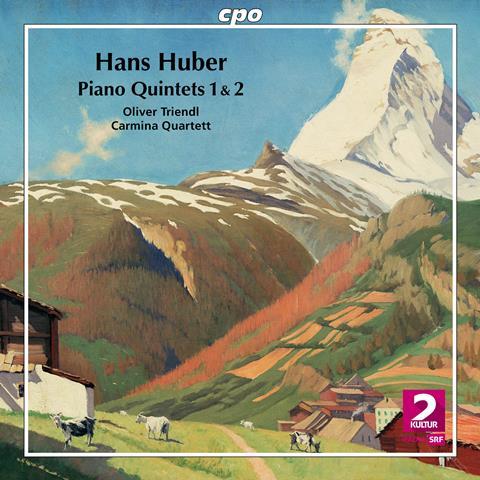Music by a neglected Romantic figure proves to be a game of two halves

The Strad Issue: September 2024
Description: Music by a neglected Romantic figure proves to be a game of two halves
Musicians: Carmina Quartet; Oliver Triendl (piano)
Works: Huber: Piano Quintets: no.1 in G minor, no.2 in G major ‘Divertimento’
Catalogue number: CPO 555 569-2
Hans Huber was born in 1852 and by the end of his life almost 70 years later had become Switzerland’s foremost composer. Rather than the ‘Swiss Grieg’ or the ‘Swiss Smetana’, however, on the evidence of his First Piano Quintet he was closer to being the Swiss Brahms. Leipzig training from 1870 inculcated him in the methods of Schumann and the mid-century Romantics, and accordingly the G minor Quintet, premiered in 1901, is aligned with the Germanic style of his elders.
Counterpoint is never far away, though tension is built and maintained more readily via harmonic and virtuosic means than by melodic memorability. It’s an effective work nevertheless, even if the opening movement seems to be over just as it’s getting going. Huber has mastered the idiom, although the individual voice is yet to define itself as distinct from, especially, Brahms, although there is also more than a hint of Dvořák in the way he places soaring string passages against rippling piano figures.
Read: Violinist Eugene Sarbu has died
Read: The Phoenix Symphony announces new concertmaster
Read: ‘A moment of audience feedback I’ll treasure forever’ - recalling musical memories with dementia
The G major Quintet was premiered seven years later, and although it is a (slightly) larger work, it bears the title ‘Divertimento’. This, at last, is where we hear Huber’s real voice. He abandons his allegiance to sonata structures and constructs something altogether more rhapsodic from a collection of Swiss folk melodies. The opening Quasi fantasia is expansive and big-hearted, the ensuing Tema con variazioni wide-ranging and the brief Intermezzo a sizzling, scintillating diversion before the weightier finale.
The Carmina Quartet and Oliver Triendl play throughout with missionary zeal. Balance between instruments is equitable, although the Zurich studio acoustic is more accommodating of strings than piano.
DAVID THREASHER



































No comments yet